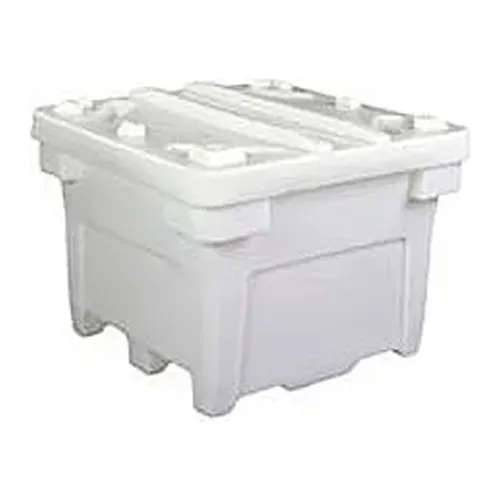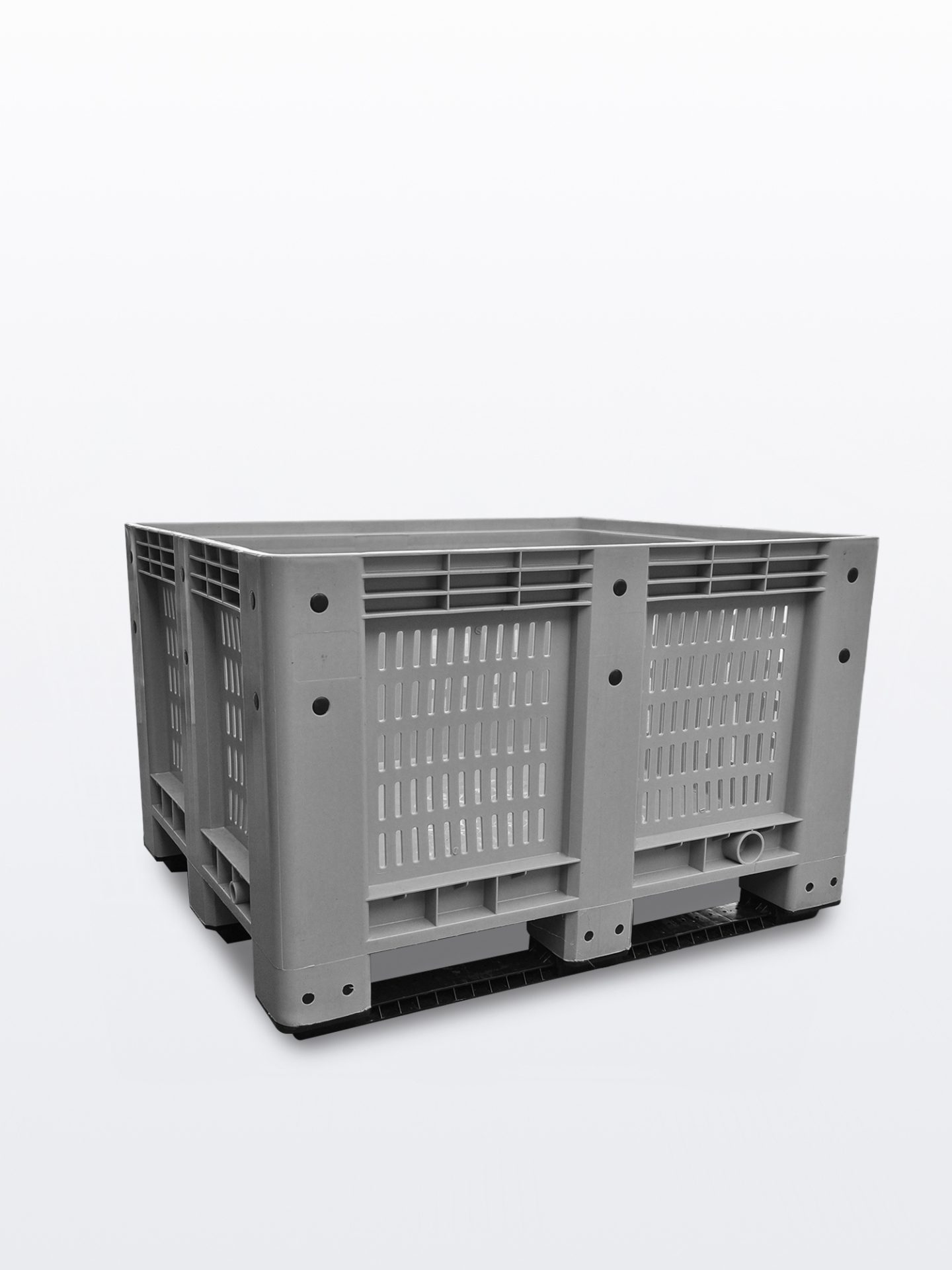How plastic bulk containers can support sustainability in your operations
The Role of Bulk Plastic Containers in Effective Recycling Practices and Sustainability
Bulk plastic containers are integral to modern-day reusing initiatives. Their style boosts the effectiveness of material collection and transportation, adding to sustainability objectives. These containers not only optimize space however additionally aid in keeping an eye on contamination levels. Nonetheless, their implementation is not without obstacles. Comprehending the full scope of their influence reveals a complex relationship in between logistics and ecological duty that calls for more expedition.
Recognizing Mass Plastic Containers
Mass plastic containers act as an important component in different markets, assisting in the storage space and transportation of products. These containers are normally made from durable products such as high-density polyethylene (HDPE) or polypropylene, which supply toughness and resistance to environmental elements. Their layout commonly consists of attributes like stackability and modularity, enabling reliable use space throughout both storage and transportation.
Industries such as agriculture, food processing, and manufacturing frequently make use of bulk plastic containers because of their lightweight nature and ease of handling. The containers come in various sizes and configurations, satisfying the certain demands of various items. Their versatility prolongs beyond mere performance; they can also be tailored with covers, manages, and labeling options to improve use - bulk plastic containers for sale. Consequently, mass plastic containers play a vital role in maximizing logistics and supply chain operations throughout numerous sectors, therefore contributing to overall performance and cost-effectiveness
Benefits of Using Mass Plastic Containers in Recycling
When companies prioritize reusing efforts, the usage of mass plastic containers significantly boosts the performance of the process. These containers are developed to enhance area, permitting the storage space and transport of larger amounts of recyclable products. This results in fewer journeys to reusing centers, therefore lowering gas intake and associated discharges.
In addition, bulk plastic containers are durable and resistant to numerous ecological elements, making sure that products stay secured during handling and transit. Their lightweight style further adds to reduce transport prices.
Furthermore, the uniformity of these containers promotes much better sorting and processing of recyclable products, which can enhance general recycling prices - Bulk Plastic Containers. Organizations that embrace bulk plastic containers likewise show a commitment to sustainability, positively influencing their brand picture. Ultimately, these benefits not only streamline reusing techniques yet additionally add to wider environmental objectives
Exactly How Bulk Plastic Containers Facilitate Material Collection
Reliable product collection is significantly enhanced by the use mass plastic containers, as they give a effective and structured service for collecting recyclable items. These containers are designed to accommodate huge quantities of products, which streamlines the sorting and storage space procedure. Their stackable style maximizes room use, making it much easier for facilities to arrange recyclables without clutter.
Additionally, bulk plastic containers are resilient and weather-resistant, permitting exterior positioning without deterioration. This resilience ensures that materials remain secured until they are collected for processing.

The harmony in shapes and size of these containers facilitates standardization across collection factors, allowing much better tracking of recyclable quantities. Their clear nature permits for easy presence of materials, aiding in the monitoring of contamination levels and ensuring that just ideal materials are accumulated. Generally, mass plastic containers play a critical role in streamlining the material collection procedure, thereby advertising effective recycling techniques.
Transportation Efficiency and Environmental Influence
Transportation effectiveness plays a vital function in the reusing process, particularly with the optimization of lots capability in bulk plastic containers. By making best use of the quantity of product carried, business can considerably decrease the number of trips called for, therefore minimizing their carbon impact. This approach not only boosts functional performance but additionally adds to more lasting ecological practices.

Maximizing Load Capacity
Although optimizing load capability is usually overlooked, it plays a vital function in improving transportation effectiveness and decreasing environmental influence in recycling methods. By taking full advantage of the quantity that mass plastic containers can hold, recycling procedures can decrease the number of trips needed for transportation. This not only decreases gas intake yet likewise reduces the wear and tear on lorries. Efficient load administration permits centers to use room properly, making certain that each transportation cycle is as productive as feasible. Additionally, well-optimized lots can bring about much better settlements with logistics service providers, potentially decreasing general prices. Eventually, boosting lots capability contributes to a more sustainable recycling system by cultivating reliable source usage and decreasing waste generated throughout transportation.
Decreasing Carbon Impact
As reusing operations venture to lessen their environmental effect, decreasing the carbon footprint related to transport emerges as an important objective. Bulk plastic containers play a vital role in accomplishing this objective by boosting tons performance and optimizing logistics. Their lightweight yet resilient design allows for maximum freight space usage, lowering the number of journeys needed to deliver materials. By combining shipments, reusing facilities can decrease fuel usage and greenhouse gas discharges. Furthermore, purposefully finding recycling centers decreases transport ranges, furthermore decreasing carbon results. Employing fuel-efficient lorries and different power sources boosts overall sustainability. By incorporating these methods, the reusing sector can substantially reduce its carbon footprint, adding to an extra lasting future.
Difficulties in using Bulk Plastic Containers

Contamination Problems
Contamination issues represent a substantial challenge in the effective use bulk plastic containers within recycling techniques. These containers commonly accumulate residues from previous components, bring about blended materials that can impede the reusing procedure. Pollutants such as food waste, chemicals, or non-recyclable products can jeopardize the integrity of the whole set, resulting in boosted disposal prices and reduced recycling prices. In addition, inappropriate cleansing or sorting can exacerbate these problems, making it hard for recycling centers to refine products efficiently. The presence of contaminants not hop over to here only influences the high quality of recycled items but additionally weakens the total sustainability efforts focused on minimizing plastic waste. Addressing these contamination difficulties is crucial for improving the effectiveness of mass plastic container recycling.
Recycling Infrastructure Limitations
Ineffectiveness in recycling infrastructure poses significant obstacles for the effective administration of mass plastic containers. Lots of recycling centers lack the ability to process huge volumes of these containers efficiently, leading to boosted delays and costs. Additionally, inadequate sorting innovations commonly result in contamination, as bulk containers may be mixed with various other materials, making complex the reusing process. Limited transport options also hinder the activity of mass plastic containers to proper reusing centers, resulting in raised landfill waste. In addition, an absence of standard methods for bulk container reusing develops complication among customers and services, even more making complex efforts to advertise sustainability. Addressing these facilities limitations is important to enhance reusing practices and make best use of the potential of bulk plastic containers in a circular economic climate.
Finest Practices for Implementing Bulk Plastic Containers
When organizations think about implementing mass plastic containers in their reusing methods, they should focus on a calculated approach that improves efficiency and reduces contamination dangers. Picking the suitable container size and type is essential to accommodate the volume of products being refined. Organizations must also establish clear labeling and signs to guide customers on proper disposal approaches, decreasing confusion and mistakes. Regular training sessions for staff can even more reinforce these techniques, guaranteeing everyone comprehends their roles in preserving recycling stability.
Additionally, companies ought to execute a regular upkeep timetable to inspect and tidy containers, protecting against the buildup of pollutants. Partnering with neighborhood recycling centers can additionally enhance the collection process, guaranteeing that materials are properly processed. Organizations need to keep an eye on and review their recycling metrics, utilizing this information to fine-tune techniques over time and advertise continual enhancement in their sustainability efforts.
The Future of Bulk Plastic Containers in Sustainable Practices
As companies increasingly prioritize sustainability, the duty of mass plastic containers in recycling techniques is set to progress significantly. Developments in products science are bring about the development of naturally degradable and recyclable alternatives, enhancing the ecological top article advantages of bulk plastic containers. In enhancement, the implementation of closed-loop systems will certainly allow for much easier collection and repurposing of these containers, lowering waste and resource usage.
Technological developments, such as wise radar, will certainly enable business to check the lifecycle of mass containers, improving efficiency in reusing processes. As consumer need for sustainable methods expands, companies will likely embrace mass plastic containers designed for reuse and lasting value. Furthermore, collaboration between federal governments and industries will certainly promote the facility of standardized recycling protocols, ensuring that mass containers are efficiently integrated right into wider sustainability initiatives. On the whole, the future of mass plastic containers shows up appealing, with significant possibility for contributing to a round economic climate.
Often Asked Questions
Just How Are Mass Plastic Containers Made and What Products Are Used?
Bulk plastic containers are typically made from high-density polyethylene (HDPE) or polypropylene (PP) These products are processed via injection molding or strike molding techniques, resulting in sturdy, light-weight containers appropriate for various storage and transportation demands.
Can Mass Plastic Containers Be Reused Numerous Times Prior To Recycling?
Yes, bulk plastic containers can be reused several times prior to reusing. Their longevity and style enable duplicated usage in numerous applications, promoting sustainability and resource efficiency while lowering the demand for brand-new containers.

What Qualifications Exist for Bulk Plastic Containers in Recycling?
Various certifications for mass plastic containers consist of the Recycling Collaboration's certification, the Cradle to Cradle Certified ™ standard, and the Lasting Product packaging Union's standards, ensuring containers satisfy particular environmental and recyclability standards for effective recycling.
Exactly How Do Mass Plastic Containers Compare to Various Other Recycling Storage Options?
Mass plastic containers offer better longevity and capability contrasted to various other reusing storage choices, decreasing the threat of contamination and assisting in efficient transportation. Their style supports far better organization, enhancing general performance in reusing procedures.
What Is the Life expectancy of a Mass Plastic Container in Recycling Processes?
The life-span of a bulk plastic container in recycling processes typically ranges from 5 to 10 years, depending upon usage, material high quality, and ecological problems, enabling numerous cycles of usage before eventual disposal or recycling.
When companies prioritize recycling efforts, the usage of mass plastic containers considerably improves the effectiveness of the procedure. Transport effectiveness plays a vital function in the reusing procedure, specifically via the optimization of load ability in dig this mass plastic containers. The use of bulk plastic containers in recycling techniques faces considerable challenges, specifically worrying contamination problems and limitations within reusing facilities. Contamination concerns represent a substantial difficulty in the efficient usage of bulk plastic containers within recycling practices. When organizations consider implementing mass plastic containers in their recycling methods, they must focus on a critical strategy that improves performance and minimizes contamination threats.